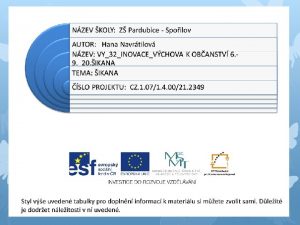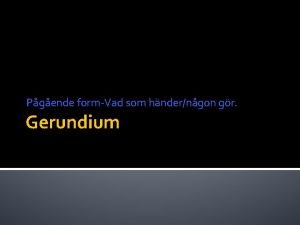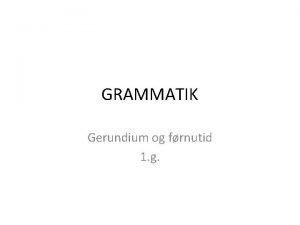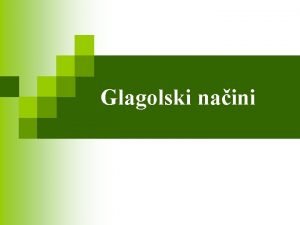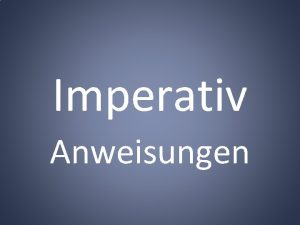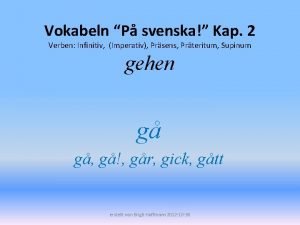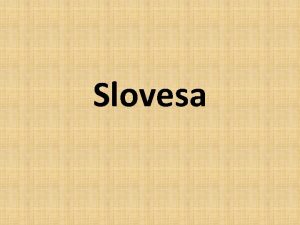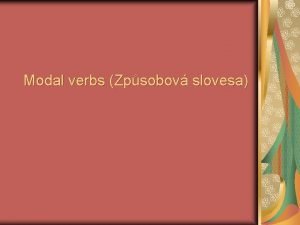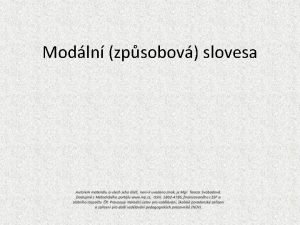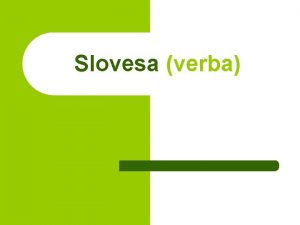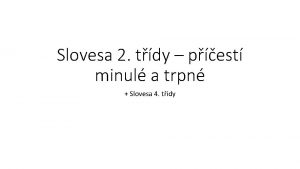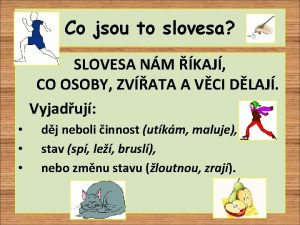Anotace Gerundium a infinitiv Slovesa po kterch se
















- Slides: 16

Anotace Gerundium a infinitiv Slovesa, po kterých se používá gerundium i infinitiv s významovým rozdílem. Věty na procvičení této gramatiky.

Remember? finish imagine don’t mind enjoy can′t stand want promise agree decide refuse forget offer need like hate prefer start love + + + Verb + - ing or to. bez podstatné změny významu

Slovesa, která se váží s gerundiem i s infinitivem, ale význam je odlišný remember stop forget try regret + ing or infinitive but meaning is different

• remember to - vzpomenout si ( vzpomenete si a až potom něco uděláte) I always remember to close the window. –Vždycky si vzpomenu a zavřu okno. • remember + ing -pamatovat si, vzpomínat). Pamatujete si, že jste něco před tím udělali, a pak na to vzpomínáte. I don′t remember closing the door. – Nepamatuji si, že jsem zamkla dveře.

• forget to - nejprve jste zapomněli a neudělali pak něco, co jste udělat měli I forgot to lock the door. – Zapomněl jsem zamknout dveře. • forget + ing - zapomněli, že jste něco před tím udělali I forgot locking the door. Zapomněla jsem, že jsem zamkla dveře.

• He stopped + ing He stopped eating chocolate. ukončení činnosti Přestal jíst čokoládu. • He stopped to eat some chocolate. kousek účel Zastavil se, aby snědl čokolády.

• try to I tried to climb the tree but failed. -(pokusil jsem se tam vylézt, cíl mého snažení bylo vylézt na strom) Pokud za slovesem ‘try’ použijete infinitiv, nevíte, zda se vám daná činnost podaří. V češtině by se tento význam dal přeložit taky jako pokusit se nebo snažit se. • try + ing The baby was crying. I tried singing a song for her. –( zkusil zazpívat písničku - cílem snažení nebylo zazpívat písničku, to umí každý, ale snažil se vlastně utišit dítě tím, že zazpívá písničku. Zkusil tedy, jestli to zabere). Pokud naopak za slovesem ‘try’ použijete gerundium, víte, že se vám daná činnost podaří, a zajímá vás výsledek.

Zápor Před infinitiv nebo gerundium vložíme NOT: I regret not calling him. I regret not going out with her.

Complete the sentences. Choose the right form. At the last minute, Sam remembered _______ his mother. to phone phoning I stopped _______tennis when I broke my arm. to playing We can go out now. It′s stopped _________. to raining We were tired, so we stopped ______ a rest. to have having Oh, here′s my mobile. I don′t remember _______ it here. to putting We stopped _______ something to drink. to buying

1. I clearly remember _____to him. Why would I lie to you? talking to talk 2. He will always remember ______ to her. It was so romantic. proposing to propose 3. Remember ____ it into the fridge as soon as you get home. putting to put 4. I forgot ____ her about it. Don't worry, I'll call her now. asking to ask 5. I'm afraid I may forget _____ the letter. Why don't you do it yourself? posting to post 6. I will never forget _______ her for the first time. meeting to meet

1. Can you try ________the window? I think it's stuck. opening to open 2. He didn't have the key so he tried _______ the chest with a screwdriver. opening to open 2. If you have the hiccups, try _______ some water. It might help. drinking to drink 3. I tried ________ the problem to my boss, but he didn't really understand. explaining to explain 4. Try _________ Susan. She might be able to help you. asking to ask 5. If your plants are dying even though you water them regularly, try _______ them less often. to watering 6. Try _______ more salt. The soup might taste better. adding to add


• regret to - nejprve lituji toho, co pak udělám. I regret to tell you that you failed the test. • regret + ing -lituji toho, co jsem předtím udělal I regret lending him the money.

• need to I need to wash my car. - já mám potřebu něco udělat • need + ing The car needs washing. - to auto je potřeba umýt, auto samotné nic nepotřebuje, pouze my soudíme, že je potřeba, aby se něco stalo.

Infinitiv vs. gerundium –obecná pomůcka Pokud jste v situaci, kdy se máte rozhodnou jestli po daném slovese bude infinitiv nebo gerundium, a nemáte po ruce žádný seznam nebo jinou pomůcku, můžete se řídit následujícím: Gerundium se často používá v případě, že činnost popisovaná druhým slovesem se odehrává před činností popisovanou prvním slovesem: She denied stealing the money. = popírá něco, co udělala dříve Infinitiv má opačné pravidlo: sloveso první se odehrává před slovesem druhým, časově jdou slovesa chronologicky po sobě: She decided to steal the money. = nejprve se rozhodla a pak ukradla Toto pravidlo však není zdaleka stoprocentní.

Použité zdroje MURPHY, Raymond. English Grammar in Use. Singapore: Cambridge University Press, 2004, ISBN 978 0521 755481. VÍT, Marek. Gerundium v angličtině [online]. [cit. 1. 5. 2013]. Dostupný na WWW: www. helpforenglish. cz SVOZÍLEK, Roman. Remember to lock vs. remember locking, Try to open vs. try opening [online]. [cit. 8. 5. 2013]. Dostupný na WWW: www. helpforenglish. cz PETERS, Sarah; GRÁF, Tomáš. Nová cvičebnice anglické gramatiky. Praha: Polyglot, 2007, ISBN 80 -86195 -00 -7.




